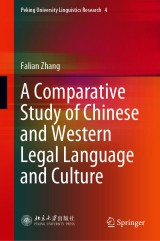Details

A Comparative Study of Chinese and Western Legal Language and Culture
Peking University Linguistics Research, Band 4
|
139,09 € |
|
| Verlag: | Springer |
| Format: | |
| Veröffentl.: | 08.03.2021 |
| ISBN/EAN: | 9789811593475 |
| Sprache: | englisch |
Dieses eBook enthält ein Wasserzeichen.
Beschreibungen
<p>This book involves a variety of aspects and levels, including the diachronic and synchronic dimensions. Law profoundly affects our daily lives, but its language and culture can at times be nearly impossible to understand. As a comparative study of Chinese and Western legal language and legal culture, this book investigates the similarities and differences of both sides and identifies their respective advantages and disadvantages. Accordingly, it considers both social and cultural functions, and both theoretical and practical values.</p><p>Firstly, the book addresses the differences, that is, the basic frameworks and disparities between the Chinese and Western legal languages and legal cultures. Secondly, it explores relevant changes over time, that is, the historical evolution and the basic driving forces that were at work before the Chinese and Western legal languages and cultures “met.” Lastly, the book elaborates on their fusion, that is, the conflicts and changes in Chinese and Western legal languages and cultures in China in the modern era, as well as the introduction, transplantation and transformation of Western legal culture.<br></p>
Chapter 1 Legal Language.- Chapter 2 Comparison between Chinese and Western Legal Terms.- Chapter 3 A Syntactic Comparison of Chinese and Western Legal Language.- Chapter 4 Comparison between Chinese and Western Legal Discourse.- Chapter 5 Legal Culture.- Chapter 6 Comparison between Chinese and Western Legal Values: Harmony and Justice.- Chapter 7 Comparison between Chinese and Western Legal Ideas: Emulating Nature and Natural Law.- Chapter 8 Comparison between Chinese and Western Legal Principles: Rule of Man and Rule of Law.- Chapter 9 Comparison between Chinese and Western Legal Standard: Obligations and Rights.- Chapter 10 Comparison between Chinese and Western Legal Property: Public Law and Private Law.- Chapter 11 Comparison between Chinese and Western Legal Justice: Substantives and Procedures.- Chapter 12 Comparison between Chinese and Western Legal Beliefs: Ethics and Religion.- Chapter 13 Comparison between Chinese and Western Legislatures.- Chapter 14 Comparison between Chinese and Western Judiciaries.- Chapter 15 Comparison between Chinese and Western Law Enforcement Agencies.- Chapter 16 Comparison between Chinese and Western Judge Cultures.- Chapter 17 Comparison of Lawyers' Culture between China and Common Law Countries.- Chapter 18 Comparison of Jury System between China and Common Law Countries.- Chapter 19 Comparison between Chinese and Western Legal Education and Legal Profession. <div><br></div>
<p><b>Falian Zhang</b> is Professor of Law at China University of Political Science and Law and President of the Chinese Association for Legal English Teaching and Testing . He is also Secretary-General of the Legal Culture Research Association of the Chinese Law Society, and Chief expert on major projects of the National Social Science Fund of China, and the member of the Legal English Translation Review Expert Committee of the Legal Work Committee of the National People's Congress. He has a varied background in education and his fields of research include Legal Language and Culture (Legal Translation), Legal Language Economics, Sino-US Relations, and Rule of Law Diplomacy. He has published, in recent years, over 50 papers in prominent journals and more than 30 books, including monographs, dictionaries and translations. </p><p></p>
<p>This book involves a variety of aspects and levels, including the diachronic and synchronic dimensions. Law profoundly affects our daily lives, but its language and culture can at times be nearly impossible to understand. As a comparative study of Chinese and Western legal language and legal culture, this book investigates the similarities and differences of both sides and identifies their respective advantages and disadvantages. Accordingly, it considers both social and cultural functions, and both theoretical and practical values.</p><p>Firstly, the book addresses the differences, that is, the basic frameworks and disparities between the Chinese and Western legal languages and legal cultures. Secondly, it explores relevant changes over time, that is, the historical evolution and the basic driving forces that were at work before the Chinese and Western legal languages and cultures “met.” Lastly, the book elaborates on their fusion, that is, the conflicts and changes in Chinese and Western legal languages and cultures in China in the modern era, as well as the introduction, transplantation and transformation of Western legal culture.<br></p>
Is an insightful, highly readable and enjoyable book Makes an original, significant and valuable contribution to the general field of comparative law Enables students and attorneys to better communicate their ideas and analysis of law both verbally and in writing, using their newly found understanding of the language and culture of Western/American law and Chinese law
Diese Produkte könnten Sie auch interessieren:

Die Grundzüge von Austins Spechakttheorie. Eine Analyse von "How to do things with Words"

von: Mirko Krämer

13,99 €
















